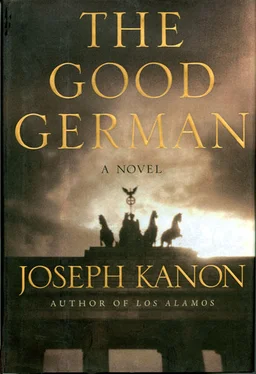Joseph Kanon
A GOOD GERMAN
The war had made him famous. Not as famous as Murrow, the voice of London, and not as famous as Quent Reynolds, now the voice of the documentaries, but famous enough to get a promise from Collier’s (“four pieces, if you can get there”) and then the press pass to Berlin. In the end, it was Hal Reidy who’d made the difference, juggling the press slots like seating arrangements, UP next to Scripps-Howard, down the table from Hearst, who’d assigned too many people anyway.
“I can’t get you out till Monday, though. They won’t give us another plane, not with the conference on. Unless you’ve got some pull.”
“Only you.” Hal grinned. “You’re in worse shape than I thought. Say hello to Nanny Wendt for me, the prick.” Their censor from the old days, before the war, when they’d both been with Columbia, a nervous little man, prim as a governess, who liked to run a pen through their copy just before they went on the air. “The Ministry of Propaganda and Public Enlightenment,“ Hal said, the way he always did. ”I wonder what happened to him. Goebbels poisoned his own kids, I hear.“
“No. Magda,” Jake said. “The gnädigefrau. In chocolates.”
“Yeah, sweets to the sweet. Nice people.” He handed Jake the traveling orders. “Have a good time.”
“You should come too. It’s a historic occasion.”
“So’s this,” Hal said, pointing to another set of orders. “Two more weeks and I’m home. Berlin. Christ. I couldn’t wait to get out. And you want to go back?”
Jake shrugged. “It’s the last big story of the war.”
“Sitting around a table, divvying up the pot.”
“No. What happens when it’s over.”
“What happens is, you go home.”
“Not yet.”
Hal glanced up. “You think she’s still there,” he said flatly.
Jake put the orders in his pocket, not answering.
“It’s been a while, you know. Things happen.”
Jake nodded. “She’ll be there. Thanks for this. I owe you one.”
“More than one,” Hal said, letting it go. “Just write pretty. And don’t miss the plane.”
But the plane was hours late getting into Frankfurt, then hours on the ground unloading and turning around, so it was midafternoon before they took off. The C-47 was a drafty military transport fitted out with benches along the sides, and the passengers, a spillover of journalists who, like Jake, hadn’t made the earlier flights, had to shout over the engines. After a while Jake gave up and sat back with his eyes closed, feeling queasy as the plane bumped its way east. There had been drinks while they waited, and Brian Stanley, the Daily Express man who had somehow attached himself to the American group, was already eloquently drunk, with most of the others not far behind. Belser from Gannett, and Cowley, who’d kept tabs on the SHAEF press office from a bar stool at the Scribe, and Gimbel, who had traveled with Jake following Patton into Germany. They had all been at war forever, in their khakis with the round correspondent patch, even Liz Yeager, the photographer, wearing a heavy pistol on her hip, cowgirl style. He’d known all of them one way or another, their faces like pins in his own war map. London, where he’d finally left Columbia in ’42 because he wanted to see the fighting war. North Africa, where he saw it and caught a piece of shrapnel. Cairo, where he recovered and drank the nights away with Brian Stanley. Sicily, missing Palermo but managing, improbably, to get on with Patton, so that later, after France, he joined him again for the race east. Across Hesse and Thuringia, everything accelerated, the stop-and-go days of fitful waiting over, finally a war of clear, running adrenaline. Weimar. Then, finally, up to Nordhausen, and Camp Dora, where everything stopped. Two days of staring, not even able to talk. He wrote down numbers-two hundred a day-and then stopped that too. A news-reel camera filmed the stacks of bodies, jutting bones and floppy genitals. The living, with their striped rags and shaved heads, had no sex.
On the second day, at one of the slave labor camps, a skeleton took his hand and kissed it, then held on to it, an obscene gratitude, gibbering something in Slavic-Polish? Russian? — and Jake froze, trying not to smell, feeling his hand buckle under the weight of the fierce grip. “I’m not a soldier,” he said, wanting to run but unable to take his hand away, ashamed, caught now too. The story they’d all missed, the hand you couldn’t shake off.
“Old home week for you, boyo, isn’t it?” Brian said, cupping his hands to be heard.
“You’ve been before?” Liz said, curious.
“Lived here. One of Ed’s boys, darling, didn’t you know?” Brian said. “Till the jerries chucked him out. Of course, they chucked everybody out. Had to, really. Considering.”
“So you speak German?” Liz said. “Thank god somebody does.”
“Berliner deutsch,” Brian answered for him, a tease.
“I don’t care what kind of deutsch it is,” she said, “as long as it’s deutsch.” She patted Jake’s knees. “You stick with me, Jackson,” she said, like Phil Harris on the radio. Then, “What was it like?” Well, what was it like? A vise slowly closing. In the beginning, the parties and the hot days on the lakes and the fascination of events. He had come to cover the Olympics in ‘36 and his mother knew somebody who knew the Dodds, so there were embassy cocktails and a special seat in their box at the stadium. Goebbels’ big party on the Pfaueninsel, the trees decked out in thousands of lights shaped like butterflies, officers swaggering along the footpaths, drunk on champagne and importance, throwing up in the bushes. The Dodds were appalled. He stayed. The Nazis supplied the headlines, and even a stringer could live on the rumors, watching the war come day by day. By the time he signed on with Columbia, the vise had shut, rumors now just little gasps for air. The city contracted around him, so that at the end it was a closed circle: the Foreign Press Club in Potsdamerplatz, up the gloomy Wilhelmstrasse to the ministry for the twice-daily briefings, on up to the Adlon, where Columbia kept a room for Shirer and they gathered at the raised bar, comparing notes and watching the SS lounging around the fountain below, their shiny boots on the rim while the bronze frog statues spouted jets of water toward the skylight. Then out the East-West Axis to the broadcasting station on Adolf Hitler Platz and the endless wrangling with Nanny Wendt, then a taxi home to the tapped telephone and the watchful eye of Herr Lechter, the blockleiter who lived in the apartment down the hall, snapped up from some hapless Jews. No air. But that had been at the end.
“It was like Chicago,” he said. Blunt and gritty and full of itself, a new city trying to be old. Clumsy Wilhelmine palaces that always looked like banks, but also jokes with an edge and the smell of spilled beer. Sharp midwestern air.
“Chicago? It won’t look like Chicago now.” This, surprisingly, from the bulky civilian in a business suit, introduced at the airport as a congressman from upstate New York.
“No, indeed,” Brian said, mischievous. “All banged about now. Still, what isn’t? Whole bloody country’s one big bomb site. Do you mind my asking? I’ve never known. What does one call a congressman? I mean, are you The Honorable?”
“Technically. That’s what it says on the envelopes, anyway. But we just use Congressman-or Mister.”
“Mister. Very democratic.”
“Yes, it is,” the congressman said, humorless.
“You with the conference or have you just come for a look-in?” Brian said, playing with him.
Читать дальше












